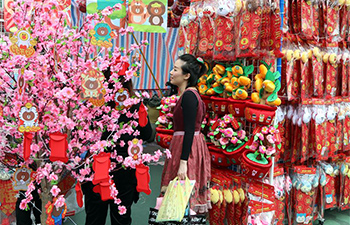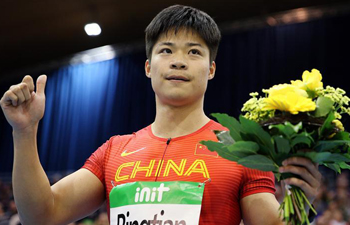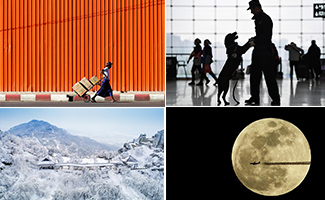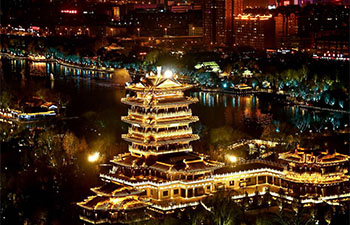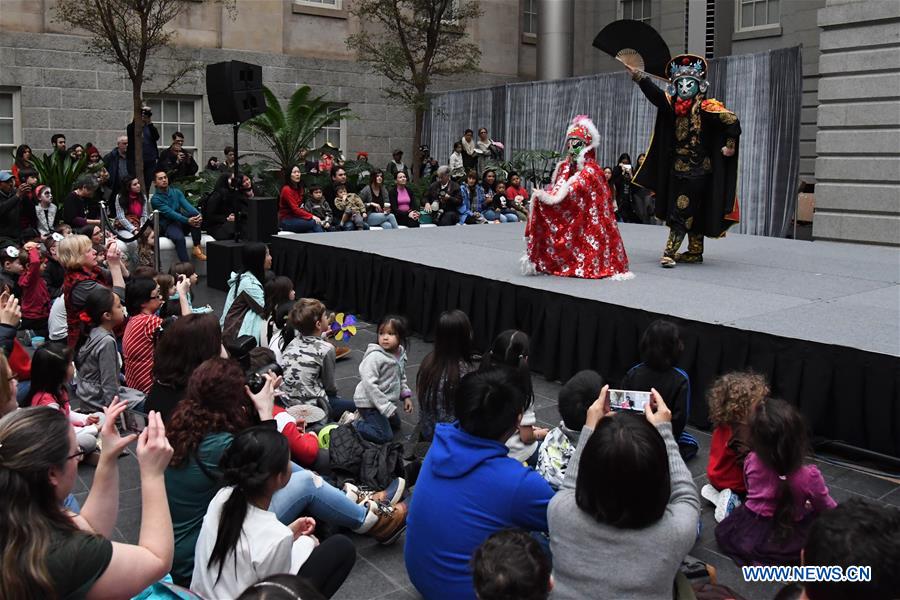
Chinese artists perform face-changing of the Sichuan Opera during the Chinese New Year Family Festival in Washington D.C., the United States, on Feb. 10, 2018. A drizzling rain on Saturday did not dampen the passion of thousands of families who came to the Smithsonian American Art Museum (SAAM) for the world's renowned facility's annual celebration of the Chinese New Year Festival. The hours-long event, the fifth of its kind by the SAAM, aimed, as it did in the past years, at promoting traditional Chinese culture and offering a taste of the Spring Festival and a unique opportunity for local residents to spend time with their families. (Xinhua/Yang Chenglin)
WASHINGTON, Feb. 10 (Xinhua) -- A drizzling rain here appeared to have discouraged people from going outside on Saturday, with a fewer pedestrians and vehicles spotted in downtown Washington D.C.
But the rain did not dampen the passion of thousands of families who came to the Smithsonian American Art Museum (SAAM) for the world's renowned facility's annual celebration of the Chinese New Year Festival.
The hours-long event inside the Kogod Courtyard, the fifth of its kind by the SAAM, aimed, as it did in the past years, at promoting traditional Chinese culture and offering a taste of the Spring Festival and a unique opportunity for local residents to spend time with their families.
"Do you know what year it is?" Stephanie Stebich, director of the SAAM, asked a crowd of audience in her opening remarks.
"It's the Year of the Dog," many, most them non-Asian, responded almost instantly, referring to the Chinese zodiac signs, which feature 12 animals.
The beginning date of the Chinese lunar New Year is based on a combination of the lunar and solar movement, so it is different in each year. It falls between Jan. 21 and Feb. 20.
The Chinese lunar New Year is named after zodiac animals, with a total of 12 zodiac signs on a circle -- Rat, Ox, Tiger, Rabbit, Dragon, Snake, Horse, Goat, Monkey, Rooster, Dog and Pig.
The upcoming Chinese Lunar New Year -- the Year of the Dog -- will start on Feb. 16 after the current Year of the Rooster ends.
Kicking off the SAAM event was a lion-dancing performance. Fathers, who had come late and could not find a good spot, simply put their kids onto their shoulders.
A mother named Tracy who drove from the neighboring state of Maryland told Xinhua that it was the third time that she had brought her son, Luke, for SAAM-held Spring Festival activities.
She said that Luke enjoys watching lion-dancing so much that he often imitates the performance by himself with a blanket at home.
Inside the huge Kogod Courtyard were hanging traditional Chinese lanterns and red-colored hangings. Besides popular lion-dancing, folk music, Sichuan Opera and Acrobatics, there were also a variety of other activities or performances throughout the event.
Parents and their children were waiting in long queues for a trial of making traditional Chinese paper-cutting, picture-making and hand-painting umbrellas, while others who crafted their own products shared their excitement with their families.
A father, named Richard, was teaching his two daughters to put together a ball-shaped ornament. He said that those activities enabled them to have a close encounter with the traditional Chinese culture and it was a good way for children to broaden their vision by knowing different different cultures.
Nodding to the long-enduring value of family unity advocated by the traditional Chinese Spring Festival culture, Richard said that the SAAM event gave him and his families a chance to spend some quality time together.
"For me, there is nothing more valuable than that," he said.
To present those well-received activities, the SAAM also partnered with the Municipal Government of Chengdu, the capital city of southwest China's Sichuan Province. As a homeland of giant pandas, Chengdu brought about notable panda-themed experiences to panda-loving locals.
One of them was a footage of Bao Bao, a female giant panda born at the National Zoo in D.C. and returned to China early last year, reminding some audience of their pleasant memory about Bao Bao's days spent here.
As the traditional Chinese Spring Festival nears, the Smithsonian's Freer and Sackler Galleries and the Kennedy Center for the Performing Arts, all in D.C., will also hold similar events as part of a broader Chinese New York celebration in the U.S. capital.





